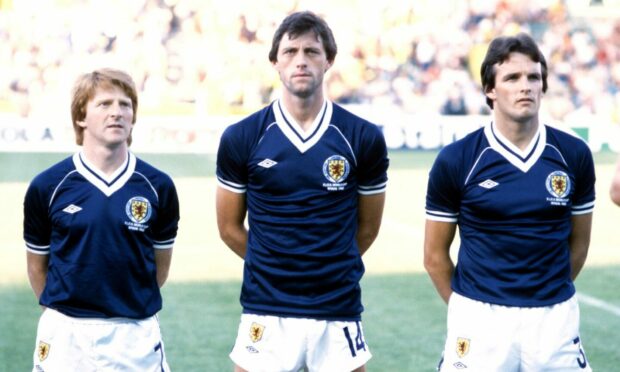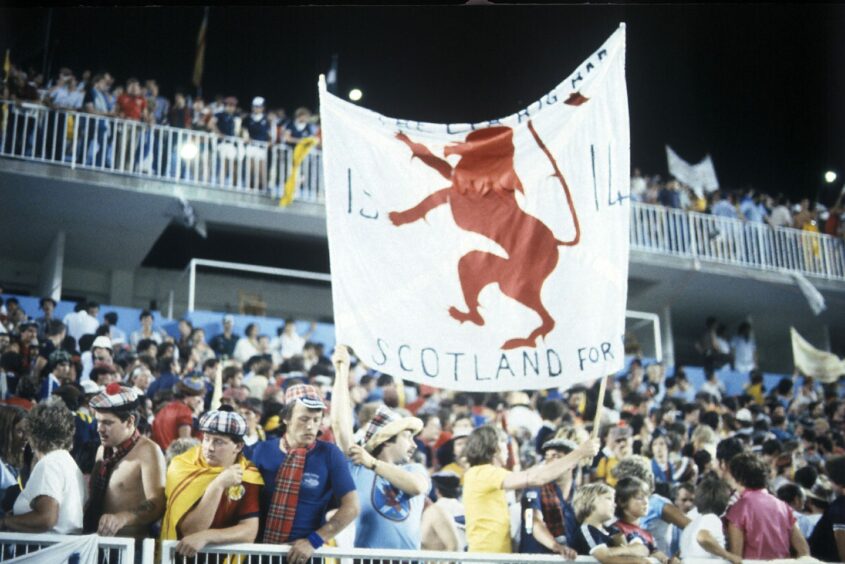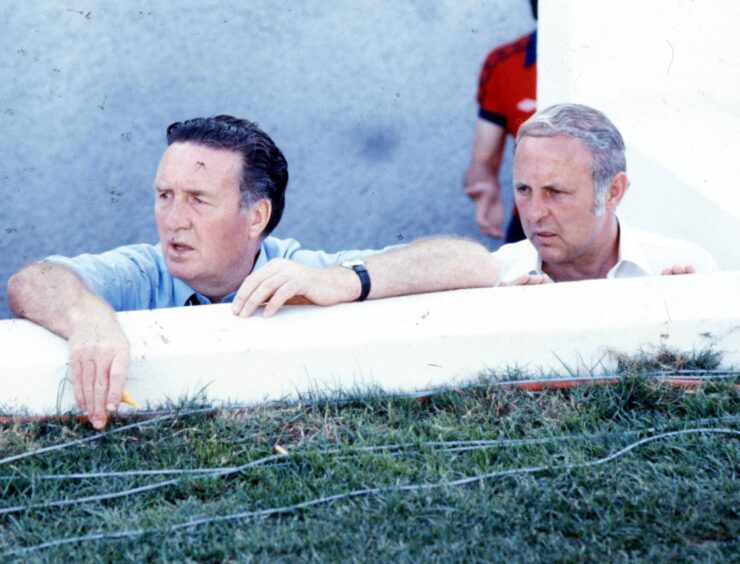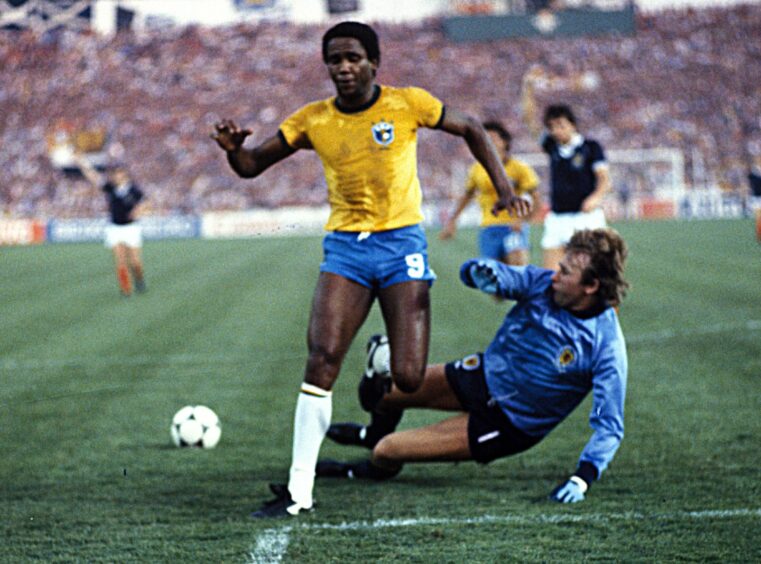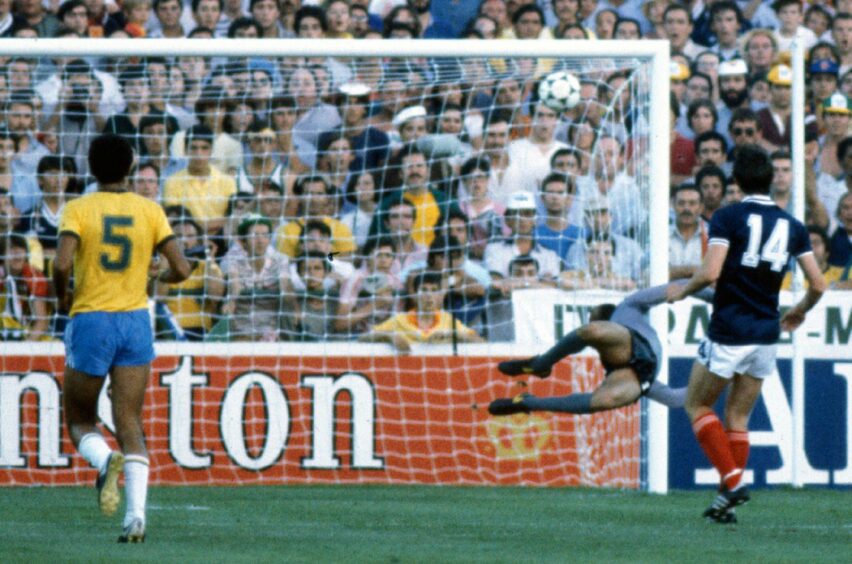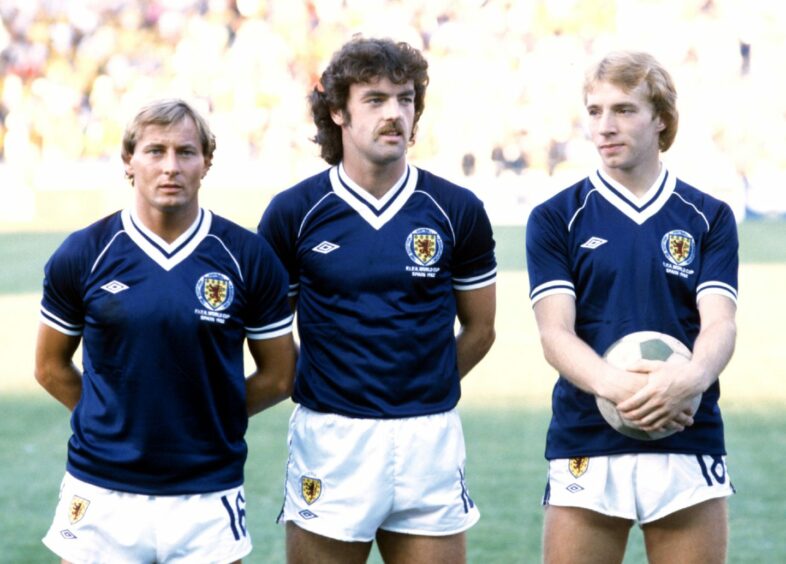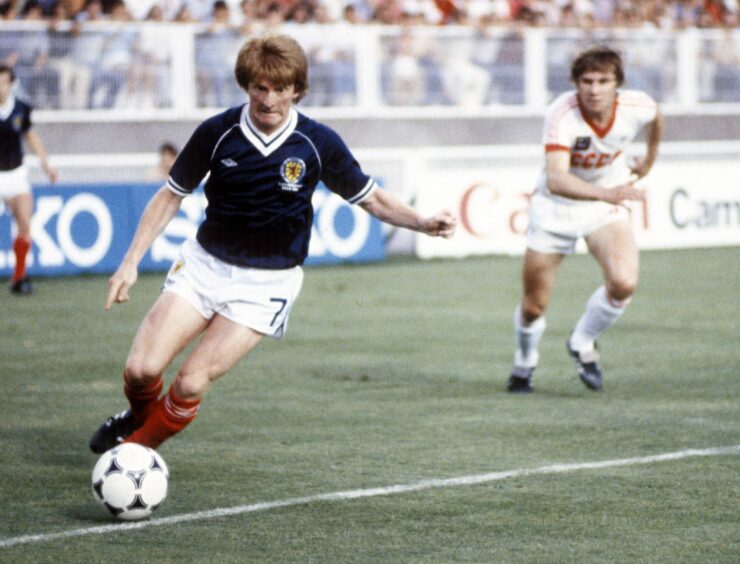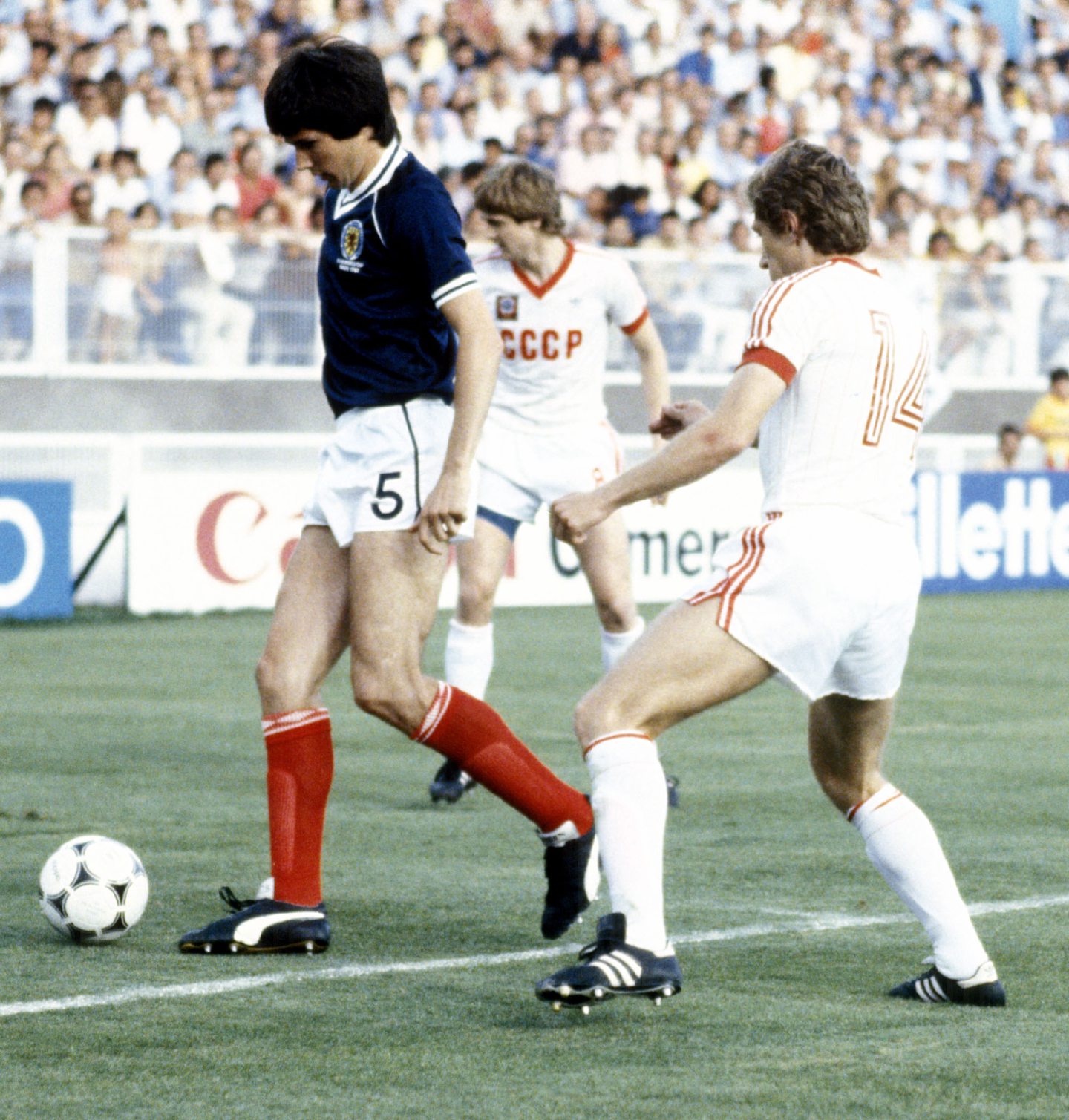Gordon Strachan knew there might be trouble ahead when he gazed up at the Brazilian team as they took the field at the 1982 World Cup.
It wasn’t just the fantastic array of talent which the South American maestros had in their ranks – flair, finesse, the full package – but their towering stature which impressed Strachan.
He was part of the Scotland line-up tasked with orchestrating a famous victory when the sides met in Seville 40 years ago.
The little Aberdeen luminary, who had won the Scottish Cup with his Pittodrie teammates just a few weeks earlier, was part of what is widely regarded as the best international squad the SFA had ever sent to a major tournament.
Yet he was typically honest when he looked back at that contest.
“That was the first time we had played against people who were different, really different,” said Strachan.
“In terms of their physique, their core strength, their height, their ability.
“Even the smallest one, Junior, who was probably the best left-back in the world, I went to challenge him and I thought: ‘I’ll go and shoulder charge him and just let him know I’m here’.
“Well, I was like one of these cartoon characters that crash into wee bits and crumble.
“Everyone talks about their ability, but their midfield were all 6ft 2in, 6ft 3in. Cerezo, Falcao, Socrates, these three were huge.
“For about 20 minutes, (we were) excellent. Then we annoyed them by scoring. Bad move. They put goals past us left, right and centre after that.”
The Scots were shaken, not stirred
It was a strange contest altogether. Jock Stein’s side was replete with tough-as-teak European champions and youthful members of the New Firm clubs who were beginning to create a major impact on their domestic circuit.
And they were joined for their Spanish stroll by none other than James Bond himself, Sean Connery, who popped along to the team hotel, lit a giant cigar and joined Jock and his squad for a swatch as they surveyed film coverage of the contest between two of their group rivals, Brazil and the USSR.
The Scots had already disposed of New Zealand 5-2 with Strachan at the centre of all their best moments with the goals coming from Kenny Dalglish, John Wark (2), John Robertson and Steve Archibald.
However, while it was an ultimately convincing win, there was some concern at how the unfancied Kiwis contrived to reduce a 3-0 deficit to 3-2 through slack defending.
Even at that stage, nobody was under any illusions that this was by far the easiest of their challenges.
Next up was a meeting with the men from the land of bossa nova, beautiful beaches and equally lustrous football – and some of the most famous players on the planet in the 1970s and 1980s.
It was a momentous occasion, one that ensured the Tartan Army, with Connery in tow, were in vociferous form, even as their country ground to a halt for what developed into another triumph of hope over experience.
But still, what a battle the underdogs served up in the opening 45 minutes.
Even during the anthems, in the sweltering heat, the sweat was lashing off the Scots whereas their rivals stood impassively without a bead of perspiration.
Yet, in the early exchanges, Stein’s team gave as good as they got, pressed hard, tackled furiously, prevented Brazil from gaining a stranglehold and created a few openings of their own.
And then, suddenly, incredibly, in the 18th minute, Dundee United’s David Narey broke the deadlock with a wonderful goal that nearly lifted the roof off the Estadio Benito Villamarin.
The Tannadice man, nicknamed Sacha after the French singer Monsieur Distel (Raindrops Keep Falling On My Head), latched on to a pass from Wark and fired it past Waldir Peres.
And then, after time stood still for a few seconds, pandemonium erupted.
It was notoriously described as a “toe-poke” by Scotland’s bete noir, Jimmy Hill, but Socrates remarked it was one of the best strikes in the tournament.
Not that Narey himself ever made any grandiose claims on his own behalf.
On the contrary, as Wark said: “Sacha didn’t have a clue what to do when it happened.
“He obviously hardly ever scored, so he ended up running around like a wee boy who didn’t know what day it was!”
Many of the supporters felt similarly bemused. But what followed was a reminder of the sublime skills the Brazilians possessed – and the longer the proceedings advanced, the more irresistible they became.
Scotland goalkeeper Alan Rough, has mixed memories of what followed.
On the one hand, he was celebrating his 50th cap with a grand World Cup joust against the Harlem Globetrotters of football.
What wasn’t there to enjoy?
But, on reflection, it wasn’t a huge amount of fun trying to prepare an efficient wall against such set-piece specialists as Socrates, Zico and Eder.
For a quarter of an hour after seizing the lead, the Scots remained steadfast and clung on to their slender advantage.
But eventually, and with a degree of inevitability, Brazil restored parity with a sumptuous Zico free kick.
Rough was criticised by some of the sterner pundits for his positioning, but Wark retorted: “I was the end man in the wall and Roughie was giving it ‘perfect, John’ with the big thumbs up.
“But, two seconds later, it was round me and in the top corner. Two keepers couldn’t have stopped it.”
No hair drier treatment from Stein
That was how matters stood at the interval and the Scots couldn’t be faulted for their application, nor their collective spirit.
Their shirts were soaking wet; these lads had run themselves into the ground for the cause.
Stein recognised as much and was pragmatic during his team talk.
He urged them to keep persevering, strive to hold on to the ball and avoid conceding more set pieces.
In some respects, his principal concern was that he didn’t lose anybody to injury or serious dehydration in the build-up to the pivotal clash with the Soviets (who had lost 2-1 to Brazil) just a few days later.
There was no disgrace in being second best to these merchants of menace.
Even the most hard-to-please pundits were left marvelling at the refulgent standard of the display served up by Zico and Co in the second period.
It was disappointing that Scotland allowed Oscar a free header to push his side in front as early as the 48th minute, but thereafter, it was an exhibition.
Brazil’s third goal was a piece of magic from Eder, who gratefully latched on to Serginho’s exquisite service and chipped over Rough with the delicacy of Tiger Woods on the fringes of the green in his prime.
The gig was up for the Scots and the majestic Falcao applied the coup de grace in the closing stages by polishing off another sweeping attack from his compadres.
It brought a 4-1 defeat, but the towel was never thrown in, despite some of Stein’s men looking like Rip van Winkle by the denouement.
Strachan said later: “In the end, it didn’t matter too much – we never saw the ball when they got going, anyway.
“I think they’re the best team never to have won a World Cup. Probably the best team I ever played, actually – except the big striker Serginho, he wasn’t that great.
“I actually swapped strips with him, which means there will be a Scotland number seven shirt somewhere in a loft in Sao Paulo.”
As for Narey, he couldn’t have cared less how Hill disparagingly described his only goal for Scotland in the 35 appearances he made for his country.
If anything, he was more worked up at discovering that his wife had taped an edition of Coronation Street over a recording of the game before he had a chance to see his goal again when he returned home from Spain.
But that was only after an immensely frustrating tussle with the USSR.
In another world, the whole of Scotland might have painted the town red when Graeme Souness scored a superb 86th-minute goal against the USSR in the crucial meeting between the combatants in Malaga.
But sadly, that was very much overshadowed by the farcical collision between Willie Miller and Alan Hansen just a few moments earlier, which allowed Ramaz Shengelia a clear run to his target before slotting the ball past Rough.
It was a sickening mistake by two of Scotland’s finest-ever defenders and, although Souness’ strike offered fresh hope, the contest ended 2-2 and the Soviets duly advanced from the group on goal difference.
What made it worse was the fact that, as Wark said: “We battered them, we really did”, only for a completely avoidable error to spell calamity.
But that has been the Groundhog Day pattern of Scotland at the World Cup.
More like this:
The trophies and the ‘toe-poke’: Dundee United great David Narey had a memorable career
Dundee United legend Jim McLean: A football life in pictures
